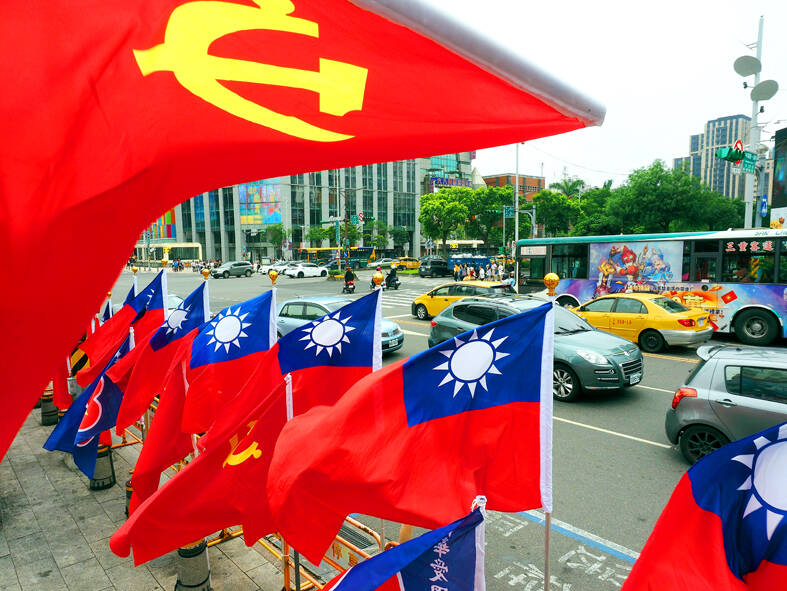Three Taiwanese affiliated with the China Unification Promotion Party (CUPP) were sentenced to prison terms ranging from six months to a year yesterday for recruiting military personnel to spy on behalf of China.
The Kaohsiung branch of the High Court sentenced CUPP deputy secretary-general Wen Lung (溫瓏) to 10 months in prison, and retired military officers Chiang Chiung-lin (江瓊麟) to one year and Chu Hsin-yu (朱新瑜) to six months over contraventions of the National Security Act (國家安全法).
All three men were also fined NT$50,000 (US$1,510), although they could choose to commute their sentences to fines of NT$1,000 per day.

Photo: David Chang, EPA-EFE
Wen, who in 2016 started a business in China importing technology and crops from Taiwan, was recruited by Chinese operatives to develop organizations of former Taiwanese military personnel on behalf of China, prosecutors said.
Wen invited Chiang, who served in the air force, and Chu, who served in the navy, on a trip to China, where they agreed to join the CUPP, the court said.
Once all three men agreed to work on behalf of Chinese Communist Party officials, they used their own connections and networks to recruit active or retired military personnel, prosecutors said.
Chu became the head of a local CUPP chapter to help with his own efforts in recruiting, prosecutors said.
In 2019, Chiang attempted to recruit an officer from the air force’s Songshan Base Command in Taipei, offering professional opportunities and financial rewards, prosecutors said.
The officer rejected the offer and reported the incident, prosecutors added.
Chu and Wen confessed to their crimes, the court said, leading to their reduced sentences.
Prosecutors said that during questioning all three admitted to having met with “united front” officials and other Chinese intelligence officers.

Alain Robert, known as the "French Spider-Man," praised Alex Honnold as exceptionally well-prepared after the US climber completed a free solo ascent of Taipei 101 yesterday. Robert said Honnold's ascent of the 508m-tall skyscraper in just more than one-and-a-half hours without using safety ropes or equipment was a remarkable achievement. "This is my life," he said in an interview conducted in French, adding that he liked the feeling of being "on the edge of danger." The 63-year-old Frenchman climbed Taipei 101 using ropes in December 2004, taking about four hours to reach the top. On a one-to-10 scale of difficulty, Robert said Taipei 101

Nipah virus infection is to be officially listed as a category 5 notifiable infectious disease in Taiwan in March, while clinical treatment guidelines are being formulated, the Centers for Disease Control (CDC) said yesterday. With Nipah infections being reported in other countries and considering its relatively high fatality rate, the centers on Jan. 16 announced that it would be listed as a notifiable infectious disease to bolster the nation’s systematic early warning system and increase public awareness, the CDC said. Bangladesh reported four fatal cases last year in separate districts, with three linked to raw date palm sap consumption, CDC Epidemic Intelligence

Two Taiwanese prosecutors were questioned by Chinese security personnel at their hotel during a trip to China’s Henan Province this month, the Mainland Affairs Council (MAC) said yesterday. The officers had personal information on the prosecutors, including “when they were assigned to their posts, their work locations and job titles,” MAC Deputy Minister and spokesman Liang Wen-chieh (梁文傑) said. On top of asking about their agencies and positions, the officers also questioned the prosecutors about the Cross-Strait Joint Crime-Fighting and Judicial Mutual Assistance Agreement, a pact that serves as the framework for Taiwan-China cooperation on combating crime and providing judicial assistance, Liang

US climber Alex Honnold left Taiwan this morning a day after completing a free-solo ascent of Taipei 101, a feat that drew cheers from onlookers and gained widespread international attention. Honnold yesterday scaled the 101-story skyscraper without a rope or safety harness. The climb — the highest urban free-solo ascent ever attempted — took just more than 90 minutes and was streamed live on Netflix. It was covered by major international news outlets including CNN, the New York Times, the Guardian and the Wall Street Journal. As Honnold prepared to leave Taiwan today, he attracted a crowd when he and his wife, Sanni,